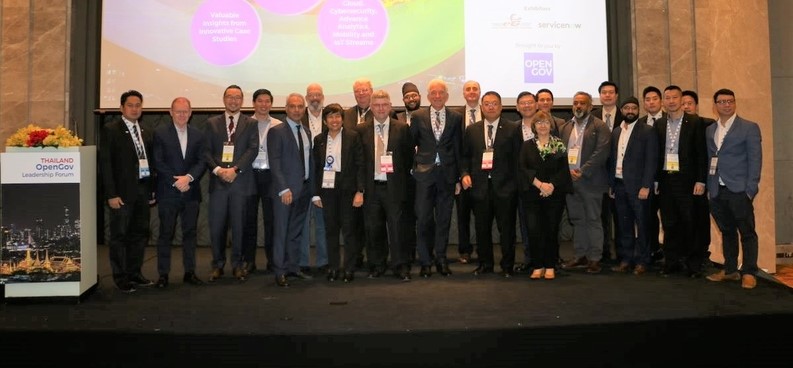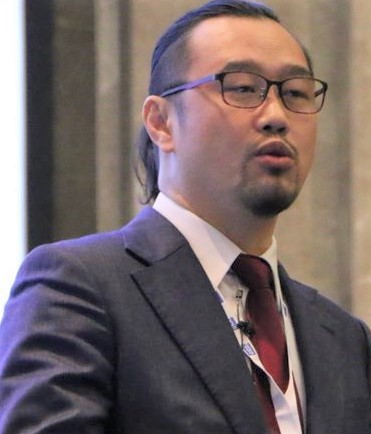
The Thailand OpenGov Leadership Forum 2019 that took place on October 17 at the Amari Watergate, Bangkok, was dedicated to its purpose of exploring and developing the digital capabilities of the Thai government across the various sectors.
The event saw delegates from various sectors come together and participate in four rounds of gamification and gain insights from the series of presentations and panel discussions.
Panel Session 3 – Banking on Digital Future
 This final panel session saw discussions on how financial institutions are embracing innovation and disruption.
This final panel session saw discussions on how financial institutions are embracing innovation and disruption.
Moderated by Klaus Felsche, the distinguished panellists included:
- Voranuch Dejakaisaya, Chief Information and Operations Officer (Bank of Ayudhya)
- Budasakorn Teerapunyachai, Senior Director Technology Risk Supervision Department (Bank of Thailand)
- Athiratt Jarnyaharn, Senior Vice President, Smart Data (FWD Life Insurance)
- Colin Dinn, Former Senior Executive Vice President and Chief Technology Officer (Siam Commercial Bank)
Why does the financial sector need to innovate?
Colin provided a succinct explanation that tech companies are offering more services and providing more customer touch-points. With that, the financial sector has to improve the standards of their services as well.
Voranuch was emphatic in her desire – we want to survive in this environment.
How do you manage fintech?
Budsakorn said that banks must adapt themselves. Trust is still a factor for people to keep their money with banks to fintech providers. She said that banks need to provide assurance by looking at how cybersecurity is handled.
“It is possible for banks to work with fintech,” said Athiratt. He said that banks need to check if FinTech providers are regulated/ compliant with the government. Matching of strengths is also important.
Voranuch stressed that banks are no longer traditional. Improving customer experience is key and there is a need to innovate to achieve that.
The government has an important role to play by ensuring that checks and balances are in place. Colin said that having a rigid and structured capability will allow for the handling growth of capabilities and opportunities.
New Zealand’s Integrated Data Infrastructure

Chris Buxton, Chief Digital Officer at Statistics New Zealand presented on the country’s integrated data infrastructure.
He said that New Zealand has two integrated data stats- an Integrated Data Infrastructure (IDI) for people and a Longitudinal Business Database (LBD) for businesses.
Looking at the IDI, he explained that datasets are linked together via a spine. The spine is connected to various deterministic data (name, date of birth, address).
It is also connected to probabilistic mechanism data sets (creating likely connections between people).
This combination of datasets usually results in a 90% link within people.
With so much information on one platform, Chris gave insights on the “five safes” framework used: Safe people, safe projects, safe settings, safe data, and safe output.
He added that NZ people are concerned about where their information is going to be stored. People want to know what is going to be done with the data.
These datasets are used for predicting social issues such as targeting services to vulnerable children with rough backgrounds.
He acknowledged that there are benefits and limitations of these projects. Most importantly, data, when used within the right guidelines, will allow for the best results out of it.
Shaping an AI-powered nation: A Singapore perspective

Koo Sengmeng, Deputy Director AI, Industry Innovation at AI Singapore (AISG) presented on the efforts taken to drive AI adoption in Singapore.
AI Singapore is a National Programme Office build to strengthen Singapore’s AI capabilities and increase its competitive edge.
Sengmeng explained that AISG is broken down into AI research, AI technology and AI industry innovation, building AI capabilities in each sector.
Driving AI adoption is just one aspect. Singapore is also looking into building AI talents.
Sengmeng listed the established programmes for achieving that: AI for Kids (AI4K), AI for Students (AI4S), AI for Everyone (AI4E) and AI for Industry (AI4I) and AI Apprenticeship Programme.
He explained that these programmes allow for Singaporeans across all ages to build knowledge and talent in AI.
Showing resemblance of such goals to that of the Thai government, he quoted the Thai labour ministry to be looking to building “professional skills development at all ages”. This is to be achieved through education and career guidance systems for students before they enter the workforce.
Sengmeng stressed that to see the benefits, a broader adoption of AI solutions should be practised. Growing AI talent and capabilities will accelerate industry and sectoral transformation.
Conclusion
Citizens should be put first when creating user-centric services. Interoperability and collaborative functioning are key to long-term and efficient citizen service delivery. Open, but secure, data sharing should be encouraged between governments to enable learning from one another.
Delegates found the forum to be an ideal platform for sharing knowledge and learning on how the public sector can be transformed into smart governance with the correct use of strategies, technologies and people.
















